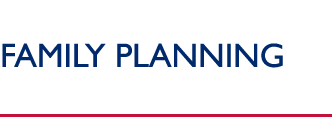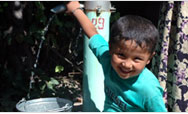Family Planning
Family Planning Strategy | Guiding Principles and U.S. Legislative and Policy Requirements
Saving Lives, Protecting Health
USAID's Family Planning program is one of the success
stories in U.S. development assistance. Since the
launch of the program in 1965, families are better able
to feed, clothe, educate, and provide health care for
their children. Countless women and children are alive
today as a result of USAID assistance.
Learn more about USAID's History of Achievements and Timeline in Family Planning.
Enabling couples to determine
whether, when, and how often to have children is vital
to safe motherhood and healthy families. Voluntary
family planning has profound health, economic, and
social benefits for families and communities:
- Protecting the health of women by reducing high-risk
pregnancies
- Protecting the health of children by allowing
sufficient time between pregnancies
- Fighting HIV/AIDS through providing information,
counseling, and access to male and female condoms
- Reducing abortions
-
Supporting women's rights and opportunities for
education, employment, and full participation in
society
- Protecting the environment by stabilizing population
growth
USAID's Family Planning Strategy
USAID advances and supports voluntary family planning and reproductive health programs worldwide. To achieve this objective, USAID's Office of Population and Reproductive Health (PRH):
- Exercises global leadership in policy, advocacy and services
- Generates, organizes and disseminates knowledge
- Provides support to the field for implementing effective programs
View USAID's Strategic Framework for Family Planning
|
The ACQUIRE Project Digital Archive
This archive constitutes legacy of The ACQUIRE Project and has been designed as a searchable knowledge resource for the reproductive health and family planning (RH/FP) community. It contains a wide range of resources that were developed over the life of the project, at both the global and the country (field) levels.
Making the Case for U.S. International Family Planning Assistance
Five former directors of USAID's Population and Reproductive Health Program urge immediate action on family planning funding in the report, Making the Case for U.S. International Family Planning Assistance.
The authors urge the new Obama administration to act and restore U.S. leadership in global family planning by more than doubling allocations to USAID family planning programs.
Download the report [PDF, 1.6MB]
Listen to an interview with author Steven Sinding (14 minutes)
MEASURE Evaluation has recently released the following publications:
|
USAID's Family Planning Guiding Principles and U.S. Legislative and Policy Requirements
Principles of voluntarism and informed choice guide USAID's family planning program. These principles are articulated in program guidelines and a number of legislative and policy requirements that govern the use of U.S. family planning assistance. The requirements fall into two general categories:
- Voluntarism and Informed Choice
USAID is committed to ensuring that women and couples in developing countries have access to voluntary family planning services and are free to make informed decisions about their reproductive lives.
- Restrictions on Support for Abortions
There are several legislative and policy restrictions relating to abortions.
USAID takes these family planning requirements very seriously and works with Missions and partners to ensure compliance with the family planning requirements in their programs.
USAID's family planning program is subject to certain restrictions on the use of funds, which are implemented through standard provisions inserted in all grants, cooperative agreements, and contracts that include family planning activities. The current standard provisions for Voluntary Population Planning Activities, including both mandatory and supplemental requirements, for cooperative agreements and grants are available in the USAID Automated Directives System (ADS) Chapter 303. The current standard provisions that apply to contracts are found Acquisition & Assistance Policy Directive 08-01.
For Assistance Awards (Cooperative Agreements and Grants):
For Contracts:
Visit the INFO Project Web Site
With funding from USAID, the INFO Project houses a large library of resources available to family planning, reproductive health, and population audiences. INFO's One Source database helps visitors search through thousands of documents, articles, photos, communications materials, online communities, and Q&As available to health care practitioners. Visit INFO
|
For more information on Family Planning, please contact kocheltree@usaid.gov. |


